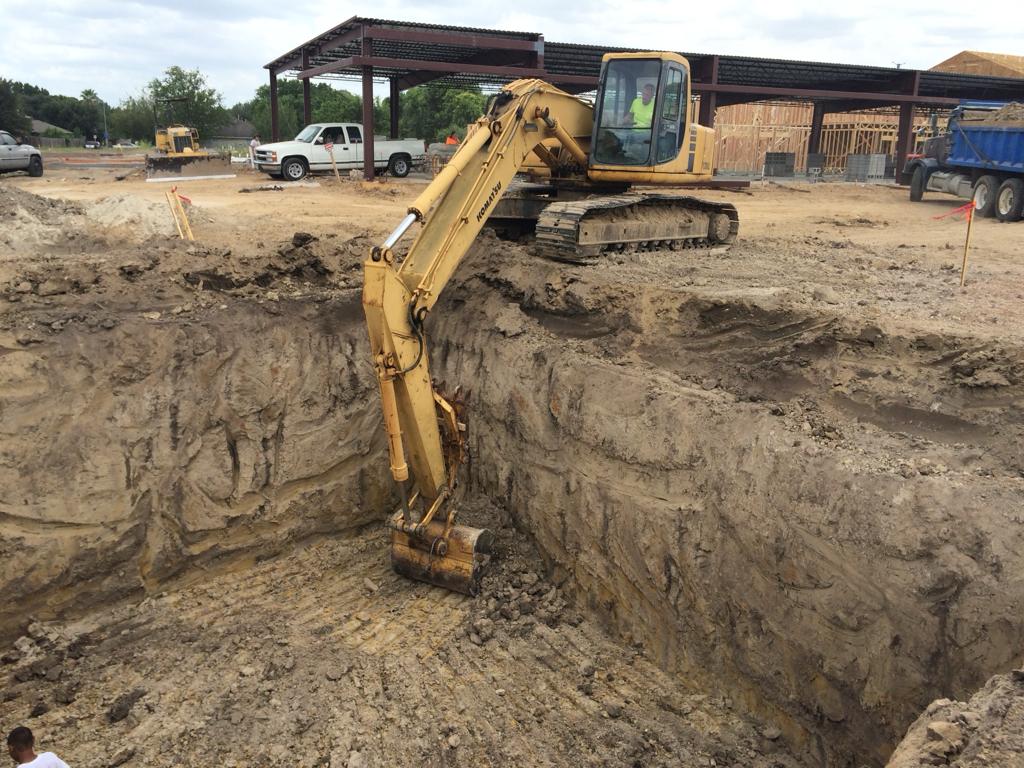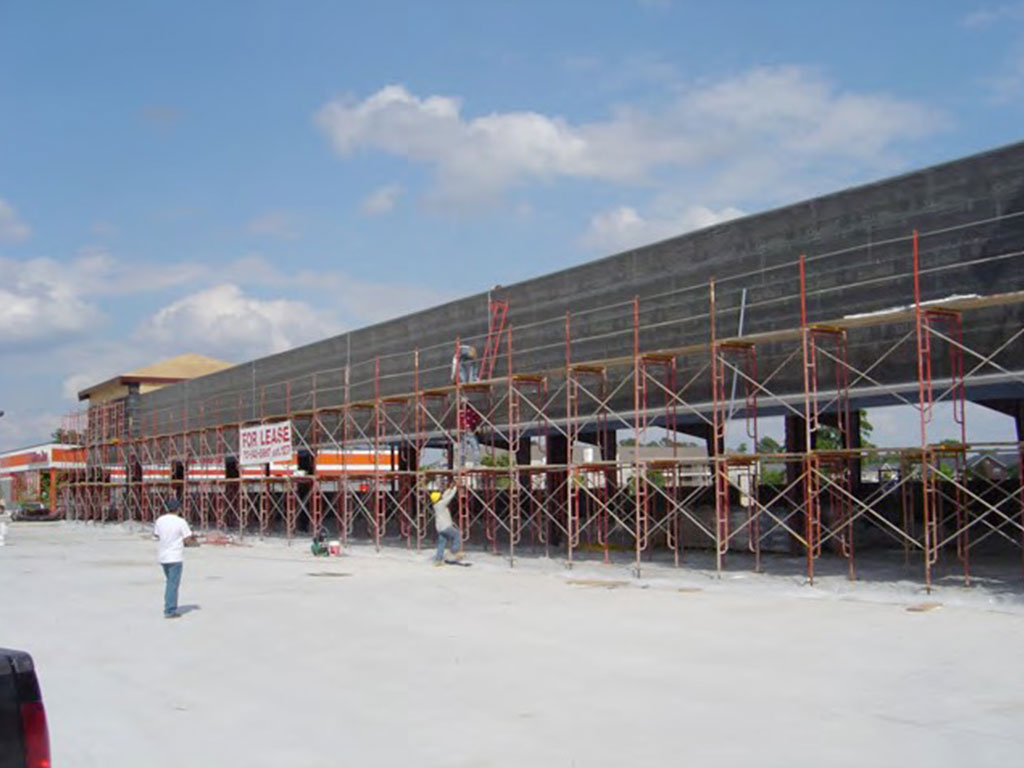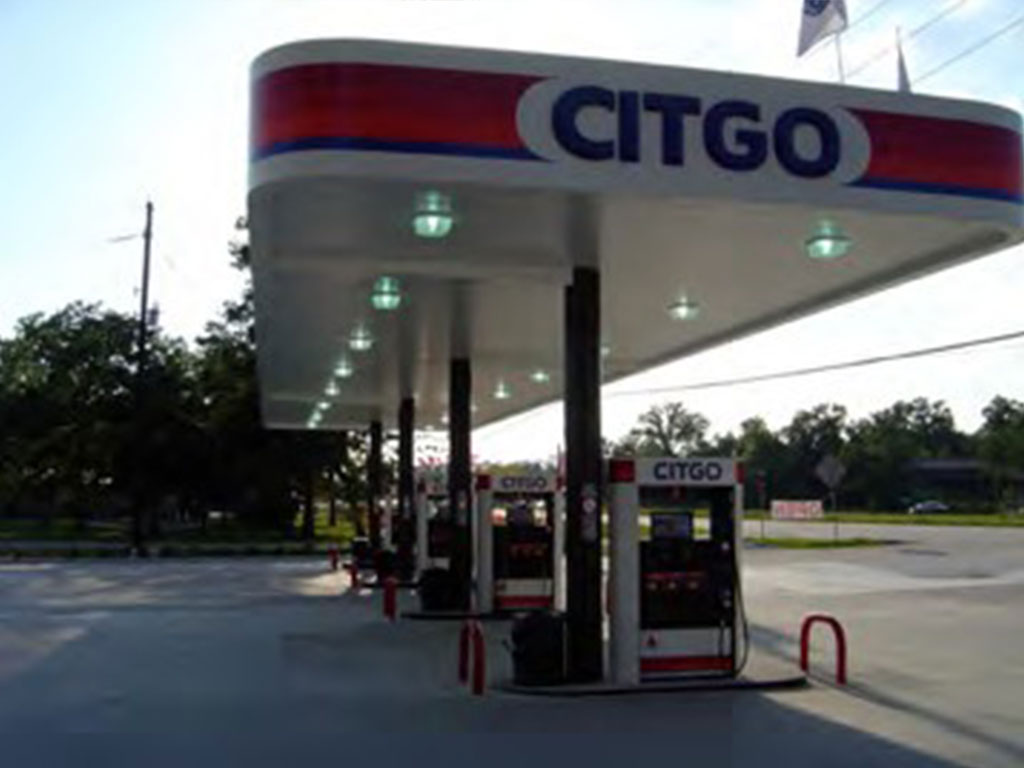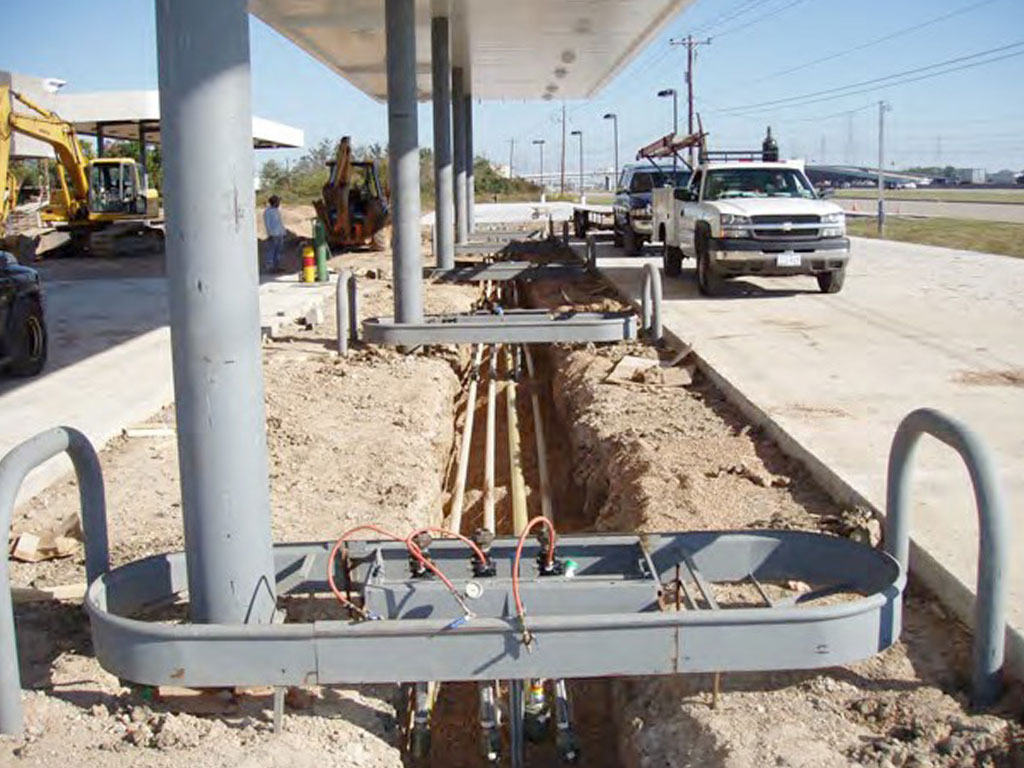
Truck Stops
- Home
- Truck Stops Contractor in HOUSTON, TEXAS
Houston Truck Stops Contractor
Navigating Highway Hubs
Houston, the fourth-largest and most bustling city in the United States, has a network of highways and roadways that support commerce and transportation. Truck stops are vital waypoints for facilitating the flow of trade and travel. Houston Truck Stops Contractors understand the essential amenities and services required to meet the fueling, repairing, and resting needs of travelers.
US Construction comprehends the primary requirements and designs structures for truck stations. We provide a detailed explanation of how a strategically planned and developed truck station navigates Texas highway hubs. Contact us to build approved and reliably structured fuel stations with innovative accommodations.
What is a Truck Stop and its Users?
In a simple sense, truck stops serve as resting points, fuel refill stations, and temporary repair facilities along highways for cars, trucks, and buses. Particular spots also have restaurants and snack stalls where travelers can eat and rest during a long journey. Truck stops sometimes have extra amenities, such as hotel rooms, for drivers to take showers and stay during long trips. Here, we list some everyday users of these service points.

- Commercial Truck Drivers: They transport goods and materials across long distances between cities. Therefore, they stay at truck stops for their necessities. They can also take advantage of repair facilities and refueling.
- Travelling families and Tourists: People who enjoy exploring new places also use truck stops. They stay there to get food, take breaks, and check the air pressure in their tires.
- Businesses and Commercial Fleets: The manufacturer of the heavy-duty machine used to transport goods by road. Therefore, deployed fleets of vehicles are loaded with finished products. They must travel for long hours at slow speeds and need to take rest and other amenities.
In short, truck stops provide fueling services and extra accommodations to make travelling pleasurable for a diverse range of users.
What Type of Facilities Do Truck Stops Provide?
Indeed, these are the resting points along the sides of highways to support the transportation industry and the general public. Conversely, individual or commercial vehicles can benefit from truck stops. Additionally, they are marked with proper signals and lighting to ensure drivers’ ease and comfort. Let’s explore the standard amenities in detail:
Fueling Services
During travel, fuel stations are the primary commodities everyone needs. Therefore, these stations offer gasoline, diesel, and other alternative fuels, such as ethanol or biodiesel, to assist divers. Commonly, multiple fueling fuel dispensers deliver different grades of fuel. The stations are adequately marked with boards to communicate important messages.
However, they have installed emergency shut-off valves, fire detectors, and vapor recovery systems to mitigate accidents. Likewise, the underground fuel tanks are constructed by regulatory standards and monitored to detect spills and leaks.
Convenience Stores
Many truck stops feature convenience stores that offer a variety of products and services. Typically, they are stocked with snacks, packaged foods, beverages, personal care products, automotive supplies, and basic groceries. According to Texas law, they also sell permitted tobacco products and alcoholic drinks.
In fact, the layout and design of stores are adjusted to regulate customer flow. Therefore, strategically arrange product shelving, refrigeration, and cash counters. Only to use the space effectively with easy visibility of items.

Restrooms and Showers
Those who travel for extended hours use the restroom facilities to take a break and rest for a short time. Therefore, it has toilet and shower areas with soap dispensers, paper towels, and hand dryers. Truck stops facilitate long-haul truck drivers and other patrons equally.
Dining Options
Truck points have on-site dining options, offering fast food, quick-serve snacks, and full-service dining. However, the United States Department of Health and the Food and Drug Administration regulate food quality and hygienic conditions. Significantly, take-away services are preferred by customers who are in a hurry.
Parking and Rest Areas
As the heavy traffic load is maintained, these truck stops are constructed with spacious and effectively designated parking areas. Houston Truck Stops Contractors possess the expertise and resources to develop concrete foundations for parking lots, incorporating security features that facilitate a seamless flow and management.
Appealing landscaping features include tables, benches, and shaded areas to enhance visitors’ enjoyment and relaxation.
Repair and Maintenance Services
Essential automotive repair and maintenance services are available to ensure a safe and secure journey. Conveniently, on-site technicians check tire inflation pressure, replace windshield wipers, perform oil changes, and charge batteries.
Additionally, more specific repair facilities are available for brake repairs, engine fault diagnostics, and trailer servicing.
Wi-Fi and Technology Services
In fact, with the prevalence of advanced technology and digitalization, users are supported with Wi-Fi access to stay connected while on the road. Moreover, some stations provide charging facilities for electronic devices and battery charging. Also, there is an online banking service for purchasing fuel.
Overall, the supporting amenities enhance patrons’ accessibility, ease, and safety during their journey. These facilities accommodate both private and commercial vehicles to improve the experience of using highways and roadways.
What are the Common Designs of Truck Stops?
Truck stops assist users more than fuel stations and serve as dynamic hubs, offering a range of facilities for drivers and vehicles. However, not all truck stops are similar; there are designs according to desired functionality, efficiency, and safety
1. Linear (Drive-Through) Layout
The simplest and most convenient layout is in a straight-line shape, with an entry point, fueling pump, parking, and exit way. It is ideal for accommodating small—to medium-scale activities.
- Easy to use with quick-service amenities
- Reduces traffic congestion with organized, lined-up parking.

2. Loop or Circular Layout
It is constructed in a loop shape. The user enters from one point, circles through the services, and leaves from the opposite side. Such layouts are suitable for medium—to large-sized truck stops.
- Centralized locating service zones for smooth traffic management.
- An extensive parking facility around the perimeter
3. Hub-and-Spoke Layout
Obviously, this hub facility has been designed to handle high traffic loads and multi-brand truck stops. Accessways are joined towards the fueling pump, parking, and other service areas.
- Effectively divided into specific zones according to proposed function.
- Amenities are in a cluster layout, like food areas, showers, and a lounge
- It acts as a modular expansion with clear signage and paths.
4. Pull-Through Layout (For Fueling)
They are the heavy-duty fueling stations with long diesel lanes that enable the users to pull in, refuel, and drive away. Commonly constructed near heavy traffic flow highways and critically busy zones.
- The driver straightens up and refuels their vehicle, then moves away without needing to reverse.
- Pay diesel pump lanes for the fastest services.
- High-clearance canopies.
The Common Design Features all Truck stops layouts should Have
Turning Radius 50–75 feet to handle regular traffic mobility Grade/Slopes Have safety features in all weather conditions Pavement Strength Durable asphalt or concrete surface that can tolerate up to 80,000+ lb loads. Drainage Effective drainage channels and separate fuel storage tanks with desired protections Lighting & Surveillance Bright area with advanced CCTV cameras What Phases Are Involved in Truck Stop Construction?
Developing a durable building structure for truck stops with innovative technologies requires extensive strategies and applications. US Construction has the professional skills and resources to plan and execute gas station construction in Houston effectively. Here, we delve deep into each phase involved in the reliable outcomes.
1. Initial Planning and Site Selection
The selection of the project site is crucial to achieving desirable results. Developing a commercial-scale truck stop requires a location that is accessible near highways and transportation hubs. Moreover, the availability of basic utility supplies is paramount.
- Feasibility Study
Our experts conduct a comprehensive feasibility analysis of each project. Therefore, they consider local traffic patterns, community trends, market competition, and the expertise required to navigate Houston-specific regulatory standards.
Moreover, this assessment involves regular traffic flow, market statistics, and budget constraints to ensure the project’s viability.
- Site Selection
The professional uses innovative technical assistance of geographic information systems to assess the map location of that particular site. Moreover, the geologists conduct land surveys to identify suitable sites.
In fact, the utility of gas stations requires easy access to main highways or trucking routes. Likewise, the soil composition of the location determines the chemistry of the concrete foundation and other supporting designs.
2. Obtaining Permits and Approvals
Conversely, executing any construction activity requires obtaining proper permits and complying with certifications to stay within defined boundaries.
Moreover, the contractors handling projects should have accreditations from the concerned authorities for their staffing and technical resources. We are the most experienced and registered partners in creating commensurate truck stops.
- Zoning Approval
Commercial, residential, or industrial projects have distinctive rules and regulations. Therefore, before starting any infrastructure development, they must get a zoning permit from the Houston Planning Department.
These land use ordinances and zoning regulations outline the proposed site’s expected use. Additionally, zoning variances or conditional use permits should be obtained if necessary.
- Building Permits
Moreover, a detailed project brief is submitted to secure a building permit from the Houston Department of Public Works and Engineering (PWE). The architects, designers, and engineers reported the project plans along with real-time monitored drawings of the sites.
All documents must comply with Houston’s building codes and regulations. Authorities approve the application, along with a site assessment report and utility layouts, after a specified period has elapsed.
- Environmental Permits
Collaborate with professionals, particularly environmental consultants, to identify potential future risks to natural resources associated with this project.
Moreover, they suggest the best possible solutions to reduce the ecological footprint of that activity. The United States Environmental Protection Agency is the main regulatory body for initial environmental examination reports.
3. Design and Engineering
In modern infrastructure development, truck stops are effectively designed and structured to meet emerging challenges. The engineer develops site maps with 3D imaging of foundations, utility supplies, electricity, and other piping.
- Site Design
The US Construction team collaborates with experienced civil engineers and architects to develop a reliable design. The pre-design of the traffic circulation, proper placement of fuel dispensers, and parking areas are necessary to regulate flow.
Moreover, the site maps also include a water drainage system to manage stormwater and control water runoffs. To facilitate access for individuals with disabilities and those with handicaps, the design should comply with the Americans with Disabilities Act (ADA) regulations.
- Structural Design
The layout design begins with the underground storage fuel tanks. The lining of the underground tanks to canopy structures over fueling dispensers resonates with the design preferences.
Also, to maintain building integrity, consider the wind flow directions, complementary material selection, and anti-seismic designs.
- Utility Planning
Likewise, the utility pipelines should be designed and installed before the foundation development phase. Therefore, Houston Truck Stop Contractors coordinate with CenterPoint Energy and the Water Department.
The standard utility infrastructure is outlined for water and wastewater disposal, natural gas supply, electricity, and networking.
4. Construction Phase
After selecting the layout and obtaining the desired certifications, construction of the gas stations begins. In this practical phase, the drawings are projected onto the natural land. Moreover, safety features are considered to ensure smooth execution.
- Site Preparation
The proposed land is cleared of vegetation and debris using heavy-duty construction machines. Indeed, the engineers begin operations by digging up the soil to a specific depth.
The depth for each project varies depending on the soil structure and geographical location. Excavators and bulldozers are used to cover the trenches and prepare the soil for construction. Likewise, motor graders are deployed for stable levelling for grading.
- Underground Utilities Installation
After excavating the ground, a network of utility and telecommunication cables is installed and welded together to form a comprehensive structure. Therefore, the experts coordinate with the relevant authorities to obtain permission and ensure the availability of supplies.
- Foundation and Structural Work
Pour concrete foundations, floors, and supportive pillars for fueling islands. The concrete mixture is formulated with steel bars, cement, and water.
Moreover, adhesives are added for durability and resistance against weathering. Likewise, for canopy supports, steel or concrete structures are used to build basic frames.
- Building Construction
The planned building units are constructed, including the convenience store, administrative offices, restroom facilities, and parking spaces.
They integrate the unique texturing of walls and floors to ensure the stable movement of vehicles. Also, the installation of emergency preparedness facilities, lighting, and HVAC systems should be considered.
- Fueling Island Installation
Install fuel dispensers with proper connections to supply lines from underground storage tanks. Additionally, maintaining upkeep services is necessary to minimize the risk of accidents and ensure personnel safety.
Additionally, pressure testing and leak exposure procedures should be investigated to assess the integrity and compliance of the fuel system.
- Landscaping and Site Improvements
Conversely, to support the design, appealing landscaping features should be included. Proper vegetation and tree cover are essential to enhance aesthetics. Additionally, ensure the installation of a lighting system, adequate signage, boundary walls, and security systems.
5. Inspection and Compliance
The infrastructure should be tested and approved for compliance with standards. Therefore, the local authorities in Houston conduct building inspections and issue completion certificates.
- Municipal Inspections
Department of Public Works and Engineering scheduled and conducted inspections of the constructed truck stations. Houston truck stop contractors are responsible for verifying their compliance with permits, building codes, and other development standards.
Inspections are arranged to verify the electricity supply, plumbing, and compliance with building fire code measures.
- Environmental Compliance
Moreover, the environmental reliability of development is assessed to verify compliance with state and local regulations. However, it may cover the storage tanks’ spillages and leakages, as well as testing of the vapor recovery system. Conversely, the stormwater management provisions are examined.
Why Choose a US Construction General Contractor in Houston
We are a renowned LLC construction company with over 40 years of experience and a proven record of success. Contact us at (713) 829-6064 or visit 7307 JOHN RALSTON ROAD, Houston, TX—77044 for more queries.
Expertise in Truck Stop Construction
Indeed, US Construction is an LLC registered company that supports the development of all types and sizes of fuel pumps nationwide. Our experts have certifications and proficiencies to handle challenging projects. Moreover, they understand Houston’s specific licensing and permitting for conducting sensitive infrastructure developments.
Comprehensive Services
We offer comprehensive construction services, covering every aspect of truck stop development from initial planning to completion.
Our experts can handle site selection, feasibility studies, permit acquisition, design/engineering, and construction. Their project management skills provide a seamless and efficient process for clients.
Regulatory Compliance
Likewise, to remain distinctive in this industry, our company holds accreditations with national and international organizations. Therefore, our professionals have updated skills and knowledge.
Moreover, the agency has desired technical assistance to execute up-to-the-mark constructions. Join us to minimize risk factors and ensure legal assurance of structural integrity.
Quality Workmanship
US Construction company delivers high-quality artistry and compliance standards in each phase of the truck stop creation. A technical hierarchy of qualified architects, engineers, contractors, and subcontractors will look after your project.
Safety Protocols
Safety is a top priority for customer satisfaction and the well-being of workers. Moreover, the integration of innovative features in the design delivers outstanding results.
They strictly follow their personnel safety protocols and emergency response procedures in truck stop construction. Therefore, Houston Truck Stop Contractors implement strategic safety plans and conduct regular inspections at each phase.
Timely Completion
Time is money, and we understand the essence of meeting project deadlines. The experts complete the construction within the allocated resources and time. We have management programs to monitor expenditure progress. Therefore, this reduces the likelihood of delays and maximizes profitability for clients.
Customer Satisfaction
US Construction prioritizes customer ease and comfort. Therefore, it fosters friendly communication and involves them at every stage. Devoted engineers highly appreciate customer feedback and suggestions. Moreover, it addresses their concerns about managing positive and collaborative relationships.
Houston Truck Stop Contractors Near Me
Simply put, highways and roadways are the primary hubs for a country’s commercial and transportation systems. Moreover, various types of rest stop for truck drivers have been introduced to enhance the travel experience for these drivers. The primary objective is to improve road transportation services for the ease and safety of users.
US Construction is partnering to provide unparalleled facilities for individual motorists and commercial truckers. We have shifted the concept of traditional fueling stations to modernized facilities that offer relaxing amenities and services.
FAQs for Houston Truck Stop Contractor Services
- What permits are required for a truck stop construction in Houston, TX?
In fact, the development of fueling stations is the most critical and needs proper approvals from the authorities. Regarding truck stop construction in TX, you require permits and approvals from the Department of Public Works and Engineering (PWE). Similarly, for a legally approved process, the U.S. Environmental Protection Agency issues land use and safety compliance.
- How much time is required to develop a truck stop in Houston?
The timeline may vary with the type and complexity of the project. Moreover, the permitting process and site selection can delay it more than expected. On average, a reliable developer like US Construction company takes 6 to 12 months to deliver a mid-sized truck stop. We cover all stages from initial feasibility studies to final inspection.
- What amenities are common in a standard truck stop construction?
The basic amenities include a fuel pump, a parking area, restrooms, a foot court, and a vehicle repair station. However, additional facilities have been added, including convenience stores, Wi-Fi access, and a hotel for accommodation. In advanced features, electric charging stations and driver lounges are more valued.
- What type of standard features does US Construction follow for truck stops?
We provide structural integrity and innovation to truck stops, enabling them to meet future challenges. Therefore, the experts use industrial-grade asphalt in pavements and reinforced concrete for other structures. Our poured surfaces can withstand a traffic load of 80,000 pounds and feature anti-skid properties. City development authorities approve them. Likewise, we follow effective drainage systems, high-clearance canopies, and safety features.
- Why is the site selection in truck stop construction the most critical phase?
Indeed, the success of truck stop construction wholly depends on its location. It should be conveniently located and easily accessible to major highways. Moreover, the availability of basic utility supplies, such as water, electricity, and gas, is of paramount importance. It should be an elevated zone to protect against heavy rainfall.



